Essay on Developing Teaching, Learning and Assessment in Education
VerifiedAdded on 2020/10/05
|6
|1069
|53
Essay
AI Summary
This essay delves into the realm of teaching, learning, and assessment within the context of education and training. It examines the application of pedagogical principles and classroom management theories across three practical examples: organizational structure, human resources, and marketing. The essay highlights the importance of adapting teaching strategies to diverse learner needs and classroom conditions. It analyzes how active learning, behavioral management theories (including those of Jacob Kounin and Rudolf Dreikurs), and principles of reciprocity and cooperation can be implemented to enhance student engagement and achievement. The author reflects on their teaching practice, providing specific examples of how they have fostered positive classroom environments and managed student behavior. The essay concludes by emphasizing the significance of understanding students' learning patterns and applying relevant pedagogical approaches to create concentrated and fostering classrooms.
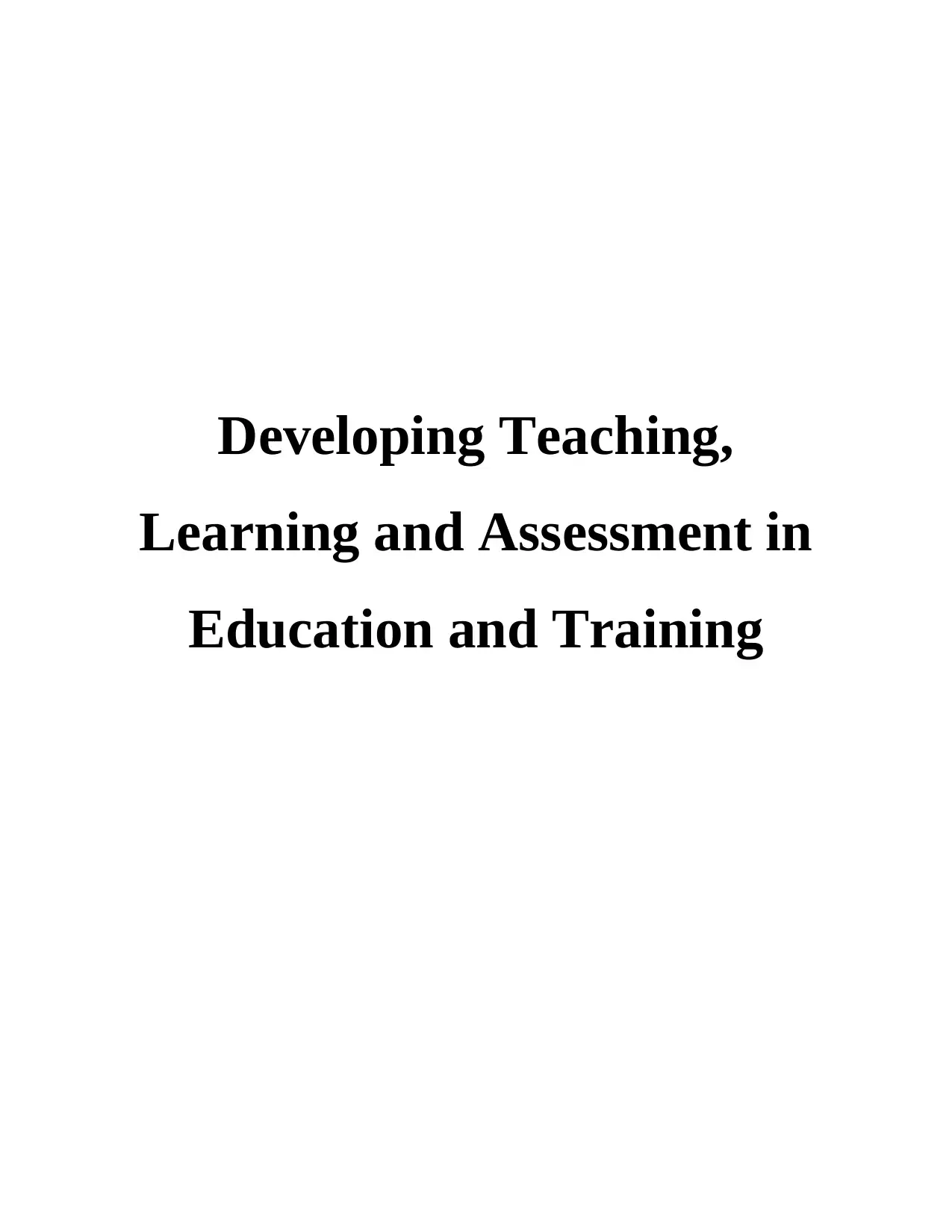
Developing Teaching,
Learning and Assessment in
Education and Training
Learning and Assessment in
Education and Training
Paraphrase This Document
Need a fresh take? Get an instant paraphrase of this document with our AI Paraphraser
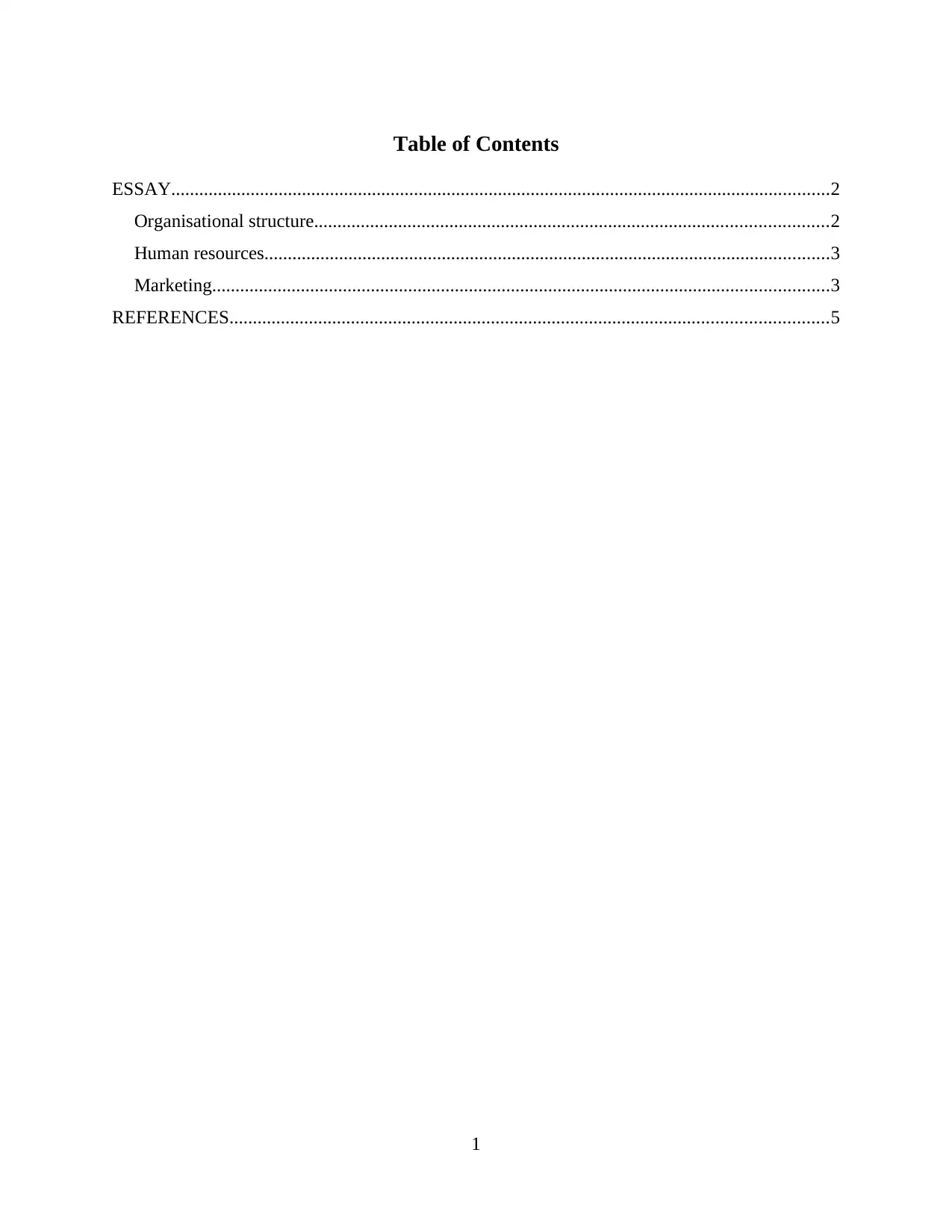
Table of Contents
ESSAY.............................................................................................................................................2
Organisational structure..............................................................................................................2
Human resources.........................................................................................................................3
Marketing....................................................................................................................................3
REFERENCES................................................................................................................................5
1
ESSAY.............................................................................................................................................2
Organisational structure..............................................................................................................2
Human resources.........................................................................................................................3
Marketing....................................................................................................................................3
REFERENCES................................................................................................................................5
1
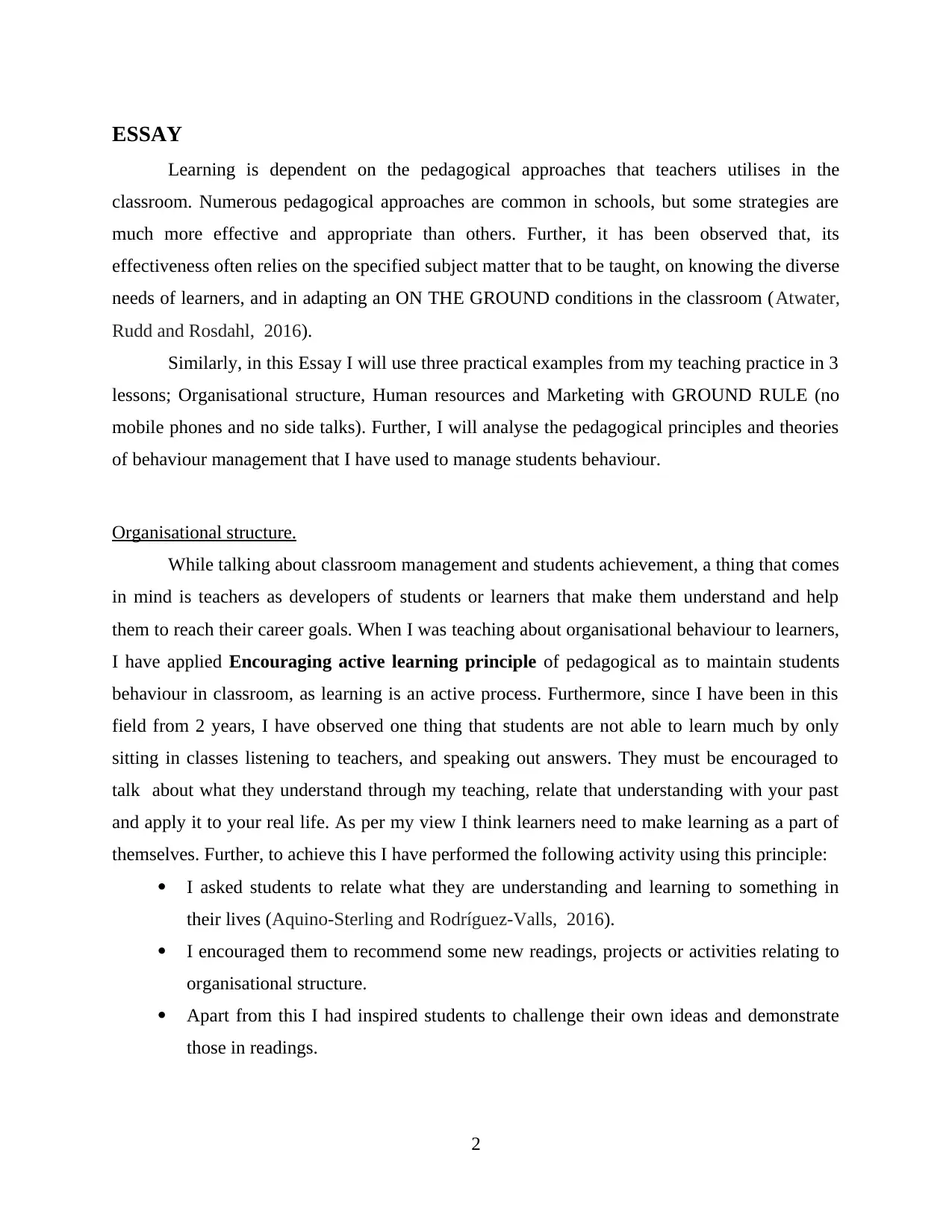
ESSAY
Learning is dependent on the pedagogical approaches that teachers utilises in the
classroom. Numerous pedagogical approaches are common in schools, but some strategies are
much more effective and appropriate than others. Further, it has been observed that, its
effectiveness often relies on the specified subject matter that to be taught, on knowing the diverse
needs of learners, and in adapting an ON THE GROUND conditions in the classroom (Atwater,
Rudd and Rosdahl, 2016).
Similarly, in this Essay I will use three practical examples from my teaching practice in 3
lessons; Organisational structure, Human resources and Marketing with GROUND RULE (no
mobile phones and no side talks). Further, I will analyse the pedagogical principles and theories
of behaviour management that I have used to manage students behaviour.
Organisational structure.
While talking about classroom management and students achievement, a thing that comes
in mind is teachers as developers of students or learners that make them understand and help
them to reach their career goals. When I was teaching about organisational behaviour to learners,
I have applied Encouraging active learning principle of pedagogical as to maintain students
behaviour in classroom, as learning is an active process. Furthermore, since I have been in this
field from 2 years, I have observed one thing that students are not able to learn much by only
sitting in classes listening to teachers, and speaking out answers. They must be encouraged to
talk about what they understand through my teaching, relate that understanding with your past
and apply it to your real life. As per my view I think learners need to make learning as a part of
themselves. Further, to achieve this I have performed the following activity using this principle:
I asked students to relate what they are understanding and learning to something in
their lives (Aquino-Sterling and Rodríguez-Valls, 2016).
I encouraged them to recommend some new readings, projects or activities relating to
organisational structure.
Apart from this I had inspired students to challenge their own ideas and demonstrate
those in readings.
2
Learning is dependent on the pedagogical approaches that teachers utilises in the
classroom. Numerous pedagogical approaches are common in schools, but some strategies are
much more effective and appropriate than others. Further, it has been observed that, its
effectiveness often relies on the specified subject matter that to be taught, on knowing the diverse
needs of learners, and in adapting an ON THE GROUND conditions in the classroom (Atwater,
Rudd and Rosdahl, 2016).
Similarly, in this Essay I will use three practical examples from my teaching practice in 3
lessons; Organisational structure, Human resources and Marketing with GROUND RULE (no
mobile phones and no side talks). Further, I will analyse the pedagogical principles and theories
of behaviour management that I have used to manage students behaviour.
Organisational structure.
While talking about classroom management and students achievement, a thing that comes
in mind is teachers as developers of students or learners that make them understand and help
them to reach their career goals. When I was teaching about organisational behaviour to learners,
I have applied Encouraging active learning principle of pedagogical as to maintain students
behaviour in classroom, as learning is an active process. Furthermore, since I have been in this
field from 2 years, I have observed one thing that students are not able to learn much by only
sitting in classes listening to teachers, and speaking out answers. They must be encouraged to
talk about what they understand through my teaching, relate that understanding with your past
and apply it to your real life. As per my view I think learners need to make learning as a part of
themselves. Further, to achieve this I have performed the following activity using this principle:
I asked students to relate what they are understanding and learning to something in
their lives (Aquino-Sterling and Rodríguez-Valls, 2016).
I encouraged them to recommend some new readings, projects or activities relating to
organisational structure.
Apart from this I had inspired students to challenge their own ideas and demonstrate
those in readings.
2
⊘ This is a preview!⊘
Do you want full access?
Subscribe today to unlock all pages.

Trusted by 1+ million students worldwide
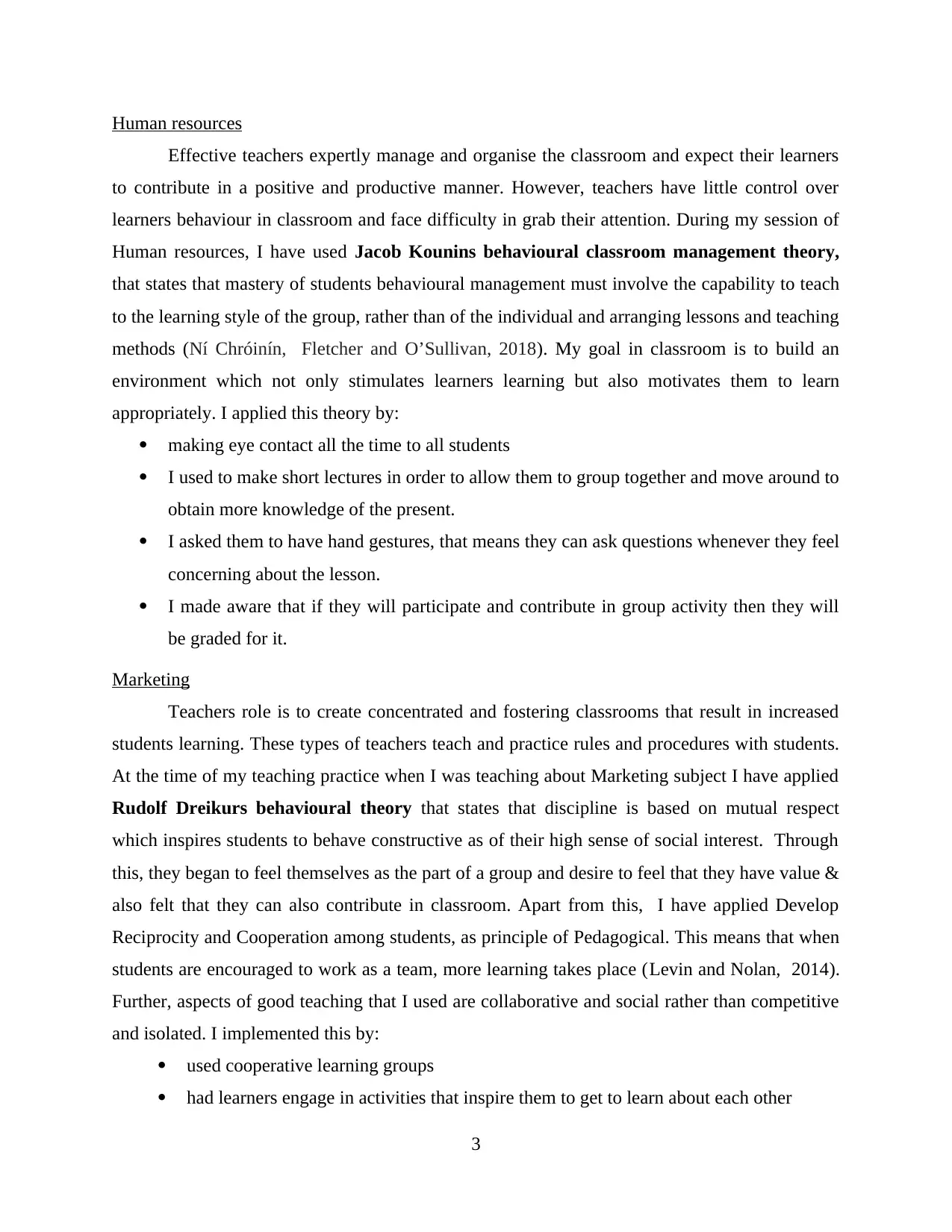
Human resources
Effective teachers expertly manage and organise the classroom and expect their learners
to contribute in a positive and productive manner. However, teachers have little control over
learners behaviour in classroom and face difficulty in grab their attention. During my session of
Human resources, I have used Jacob Kounins behavioural classroom management theory,
that states that mastery of students behavioural management must involve the capability to teach
to the learning style of the group, rather than of the individual and arranging lessons and teaching
methods (Ní Chróinín, Fletcher and O’Sullivan, 2018). My goal in classroom is to build an
environment which not only stimulates learners learning but also motivates them to learn
appropriately. I applied this theory by:
making eye contact all the time to all students
I used to make short lectures in order to allow them to group together and move around to
obtain more knowledge of the present.
I asked them to have hand gestures, that means they can ask questions whenever they feel
concerning about the lesson.
I made aware that if they will participate and contribute in group activity then they will
be graded for it.
Marketing
Teachers role is to create concentrated and fostering classrooms that result in increased
students learning. These types of teachers teach and practice rules and procedures with students.
At the time of my teaching practice when I was teaching about Marketing subject I have applied
Rudolf Dreikurs behavioural theory that states that discipline is based on mutual respect
which inspires students to behave constructive as of their high sense of social interest. Through
this, they began to feel themselves as the part of a group and desire to feel that they have value &
also felt that they can also contribute in classroom. Apart from this, I have applied Develop
Reciprocity and Cooperation among students, as principle of Pedagogical. This means that when
students are encouraged to work as a team, more learning takes place (Levin and Nolan, 2014).
Further, aspects of good teaching that I used are collaborative and social rather than competitive
and isolated. I implemented this by:
used cooperative learning groups
had learners engage in activities that inspire them to get to learn about each other
3
Effective teachers expertly manage and organise the classroom and expect their learners
to contribute in a positive and productive manner. However, teachers have little control over
learners behaviour in classroom and face difficulty in grab their attention. During my session of
Human resources, I have used Jacob Kounins behavioural classroom management theory,
that states that mastery of students behavioural management must involve the capability to teach
to the learning style of the group, rather than of the individual and arranging lessons and teaching
methods (Ní Chróinín, Fletcher and O’Sullivan, 2018). My goal in classroom is to build an
environment which not only stimulates learners learning but also motivates them to learn
appropriately. I applied this theory by:
making eye contact all the time to all students
I used to make short lectures in order to allow them to group together and move around to
obtain more knowledge of the present.
I asked them to have hand gestures, that means they can ask questions whenever they feel
concerning about the lesson.
I made aware that if they will participate and contribute in group activity then they will
be graded for it.
Marketing
Teachers role is to create concentrated and fostering classrooms that result in increased
students learning. These types of teachers teach and practice rules and procedures with students.
At the time of my teaching practice when I was teaching about Marketing subject I have applied
Rudolf Dreikurs behavioural theory that states that discipline is based on mutual respect
which inspires students to behave constructive as of their high sense of social interest. Through
this, they began to feel themselves as the part of a group and desire to feel that they have value &
also felt that they can also contribute in classroom. Apart from this, I have applied Develop
Reciprocity and Cooperation among students, as principle of Pedagogical. This means that when
students are encouraged to work as a team, more learning takes place (Levin and Nolan, 2014).
Further, aspects of good teaching that I used are collaborative and social rather than competitive
and isolated. I implemented this by:
used cooperative learning groups
had learners engage in activities that inspire them to get to learn about each other
3
Paraphrase This Document
Need a fresh take? Get an instant paraphrase of this document with our AI Paraphraser
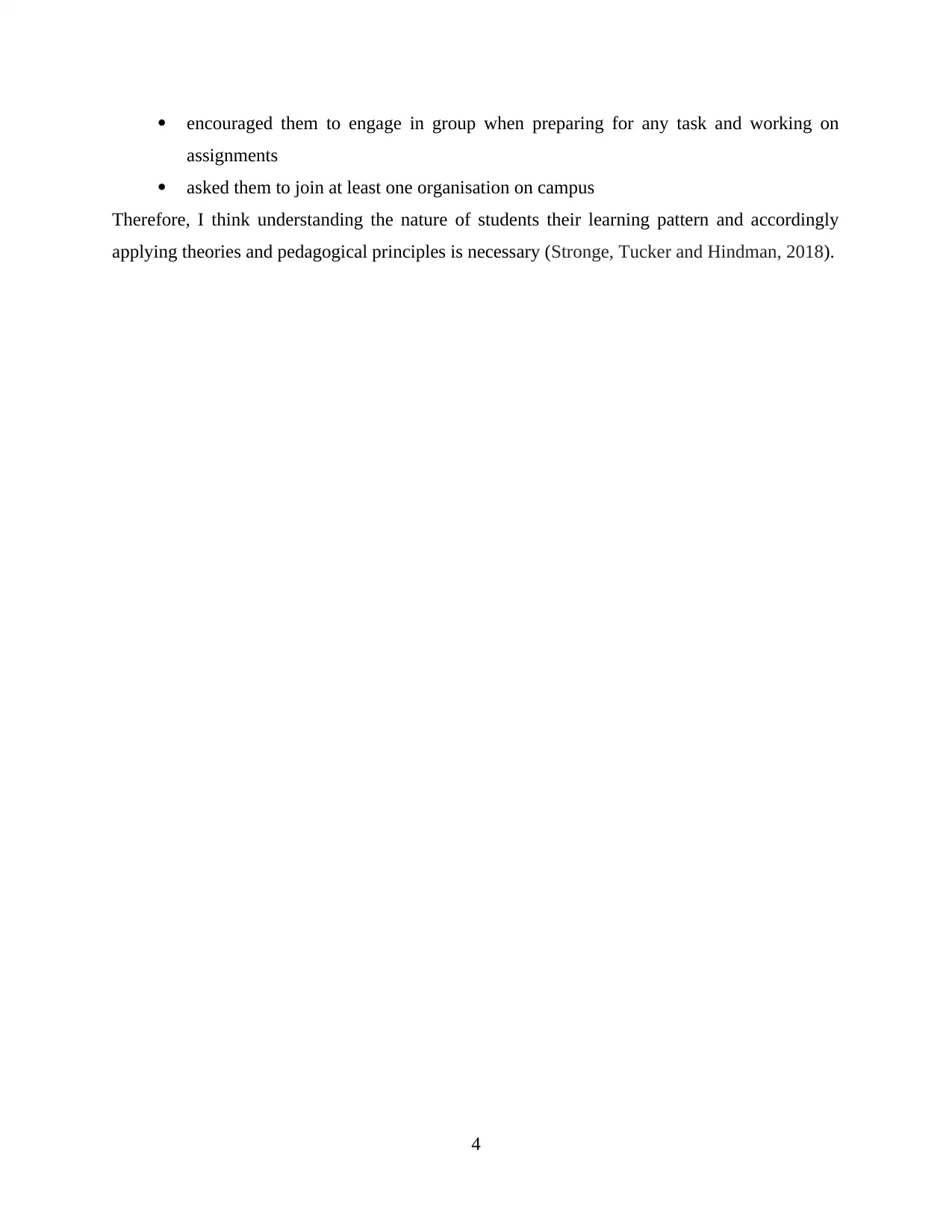
encouraged them to engage in group when preparing for any task and working on
assignments
asked them to join at least one organisation on campus
Therefore, I think understanding the nature of students their learning pattern and accordingly
applying theories and pedagogical principles is necessary (Stronge, Tucker and Hindman, 2018).
4
assignments
asked them to join at least one organisation on campus
Therefore, I think understanding the nature of students their learning pattern and accordingly
applying theories and pedagogical principles is necessary (Stronge, Tucker and Hindman, 2018).
4
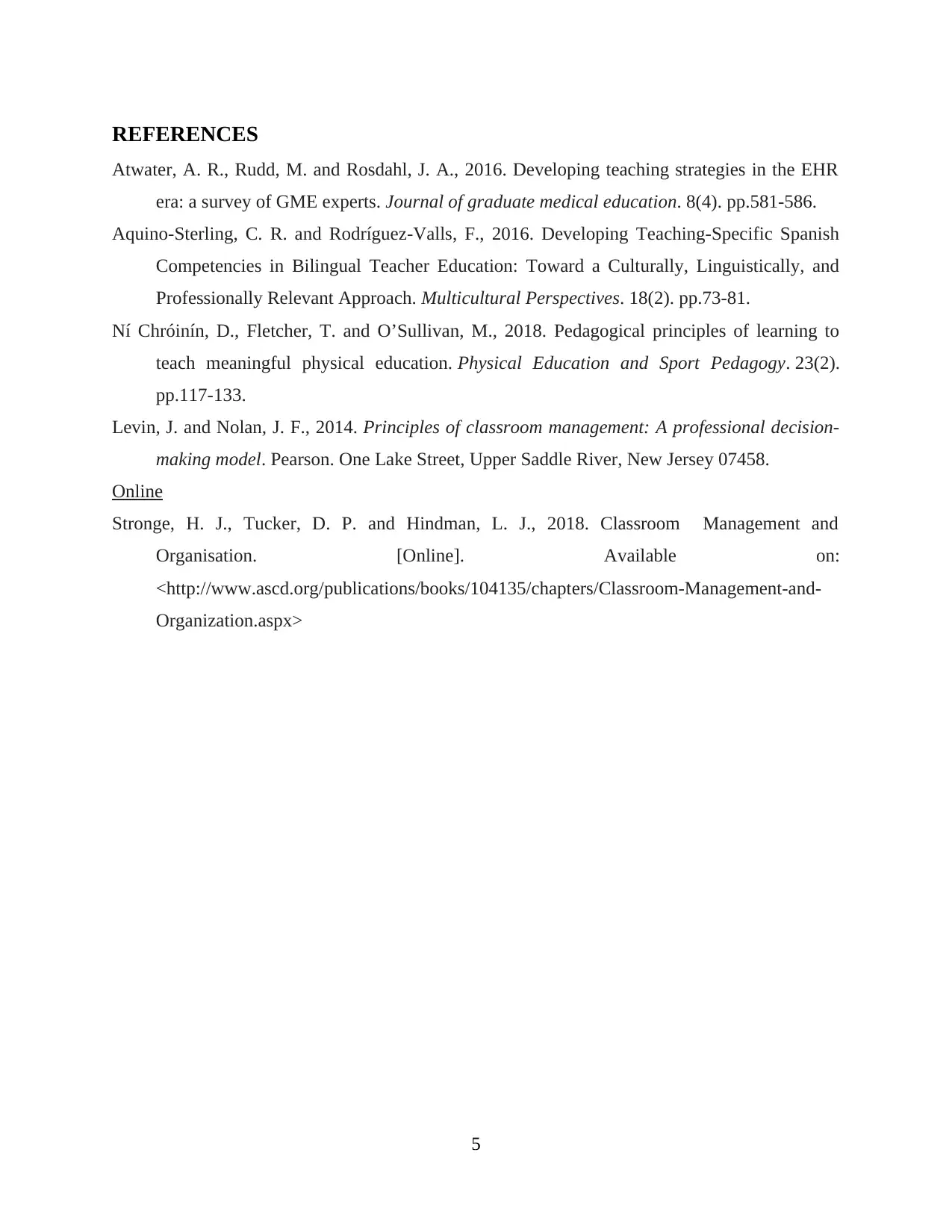
REFERENCES
Atwater, A. R., Rudd, M. and Rosdahl, J. A., 2016. Developing teaching strategies in the EHR
era: a survey of GME experts. Journal of graduate medical education. 8(4). pp.581-586.
Aquino-Sterling, C. R. and Rodríguez-Valls, F., 2016. Developing Teaching-Specific Spanish
Competencies in Bilingual Teacher Education: Toward a Culturally, Linguistically, and
Professionally Relevant Approach. Multicultural Perspectives. 18(2). pp.73-81.
Ní Chróinín, D., Fletcher, T. and O’Sullivan, M., 2018. Pedagogical principles of learning to
teach meaningful physical education. Physical Education and Sport Pedagogy. 23(2).
pp.117-133.
Levin, J. and Nolan, J. F., 2014. Principles of classroom management: A professional decision-
making model. Pearson. One Lake Street, Upper Saddle River, New Jersey 07458.
Online
Stronge, H. J., Tucker, D. P. and Hindman, L. J., 2018. Classroom Management and
Organisation. [Online]. Available on:
<http://www.ascd.org/publications/books/104135/chapters/Classroom-Management-and-
Organization.aspx>
5
Atwater, A. R., Rudd, M. and Rosdahl, J. A., 2016. Developing teaching strategies in the EHR
era: a survey of GME experts. Journal of graduate medical education. 8(4). pp.581-586.
Aquino-Sterling, C. R. and Rodríguez-Valls, F., 2016. Developing Teaching-Specific Spanish
Competencies in Bilingual Teacher Education: Toward a Culturally, Linguistically, and
Professionally Relevant Approach. Multicultural Perspectives. 18(2). pp.73-81.
Ní Chróinín, D., Fletcher, T. and O’Sullivan, M., 2018. Pedagogical principles of learning to
teach meaningful physical education. Physical Education and Sport Pedagogy. 23(2).
pp.117-133.
Levin, J. and Nolan, J. F., 2014. Principles of classroom management: A professional decision-
making model. Pearson. One Lake Street, Upper Saddle River, New Jersey 07458.
Online
Stronge, H. J., Tucker, D. P. and Hindman, L. J., 2018. Classroom Management and
Organisation. [Online]. Available on:
<http://www.ascd.org/publications/books/104135/chapters/Classroom-Management-and-
Organization.aspx>
5
⊘ This is a preview!⊘
Do you want full access?
Subscribe today to unlock all pages.

Trusted by 1+ million students worldwide
1 out of 6
Related Documents
Your All-in-One AI-Powered Toolkit for Academic Success.
+13062052269
info@desklib.com
Available 24*7 on WhatsApp / Email
![[object Object]](/_next/static/media/star-bottom.7253800d.svg)
Unlock your academic potential
Copyright © 2020–2026 A2Z Services. All Rights Reserved. Developed and managed by ZUCOL.




